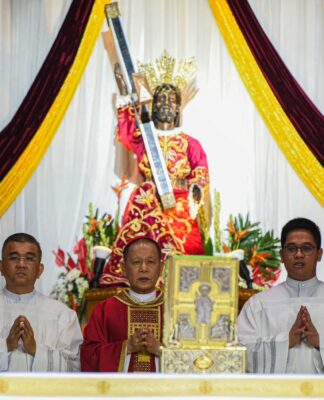 THE ECONOMIC downturn felt in the country today started with uncontrolled spending in the United States, leading to an economic and financial meltdown in the West that has reverberated all over the world, a veteran business journalist said.
THE ECONOMIC downturn felt in the country today started with uncontrolled spending in the United States, leading to an economic and financial meltdown in the West that has reverberated all over the world, a veteran business journalist said.
Delivering the 6th Jose Villa Panganiban Lecture, BizNewsAsia publisher and editor in chief Antonio “Tony” Lopez said America’s dependence on debt and the unchecked greed of its financial institutions has now put developing economies like the Philippines in a tough situation.
“Banks became reckless, lending money to people who could not repay (housing) loans. It was deemed that spending was patriotic. Buy, buy, buy and you help the economy, you help the United States,” Lopez, a UST Journalism alumnus, told the forum last February 6 at the Rizal Conference Hall, St. Raymund’s Building.
“Americans do not have savings. Consumption is their lifestyle. Credit is their lifeline,” he added.
Signs of a financial catastrophe emerged as early as 2005 when interest rates began going up. The shock was felt in September last year when huge investment banks tanked, Lopez explained to junior and senior Journalism students.
“The result was an avalanche of defaults, from the home buyer, to the first lender, to the next lender, to the big banks, to the stock market, and finally to the whole financial system. The crisis became what they call ‘systemic,’” Lopez said.
Unfortunately, when “America sneezes, the world catches pneumonia.” And so the crisis in the West found its way to the country, he said.
Now that consumer confidence and spending has dropped in America, demand for exports has slowed down, affecting the Philippine economy which is largely dependent on trade.
The Philippines is a major exporter of assembled electronics and semiconductors to the US. Companies like Intel, Texas Instruments, and Sanyo Denki Philippines Inc., have retrenched their workers, scaled down operations, or closed shop.
Lopez said the media should stop aggravating the condition by putting out bad news.
“Media reporting on the crisis worsened it. Constant and incessant bombarding of bad news creates a climate of fear, panic, and uncertainty,” he said.
Lopez said that developing nations like the Philippines will still grow this year, but at half the rate of last year’s growth. He also argued that the Philippines “is not that poor” since it has the world’s 36th largest economy.
“The Philippines is unique as a poor country. Filipinos spend more for e-loading and texting than for their milk, coffee, and patis. Is that the behavior of a poverty-stricken people?” he said.
Lopez is an analyst and specialist writer on business, banking, and economy. He was a correspondent of Asiaweek and the youngest business editor of the Times Journal. He was managing editor of the Varsitarian in 1970.
The lecture, endowed by the Varsitarian and co-organized by the UST Journalism Society, honors Panganiban, founder of the Varsitarian.
Previous lecturers have included Alice Colet-Villadolid, Jullie Yap-Daza and Eugenia Duran-Apostol. Danielle Clara P. Dandan














